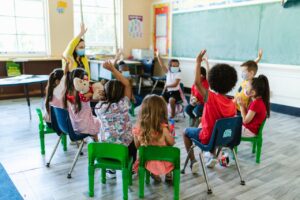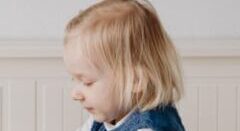Ah, kindergarten! The fun, rainbow-coloured world of ABCs, 123s, and friendships. This is the first milestone of your baby’s life that is not academic, and it’s always bittersweet as a parent. You’re so happy to see them develop and flourish, but you’re also worried about all the transformation.

But fear not! Your kid can be excited and confident to walk through those big school doors with a little preparation. So, put on your teacup, stop, and relax. Then, we will dive into setting your child up for kindergarten success. It isn’t that hard (or hard, not fun!)
1. Let’s Get It Down To Earth: Habits Are The Key
The first thing you can do to help your child prepare for kindergarten creates a predictable daily routine. Kids like routine, and it’s easier to anticipate what to expect daily when going from home to school.
How to Do It
Time to Get Up: Begin getting up around the same time as school. This will allow your child to get used to the early morning and won’t stress them out getting out the door. Make a simple list of what to do each morning: brush your teeth, put on clothes, have breakfast, etc. Children who know the sequence of events are calmer and more prepared for the day.
Bedtime Habit: Slowly transition their bedtime so they sleep. A tired kid will have more energy to enjoy their new school routine. Ideally, 10-12 hours of sleep is ideal, but this will vary with your child’s age and need.
Memorize Time Management: Young children entering kindergarten are very time-poor at transitions. Allow yourself a few minutes daily when your child does short-timed tasks like dressing or washing up after play. It prepares them for the institutional setting of school.
To read more about routines and children, visit this [journal by the American Academy of Pediatrics](https://pediatrics.aappublications.org/content/144/1/e20190293).
2. Grow Social: It’s Play or Die
The school day isn’t all classrooms, either — kindergarten is where your kid will start learning vital social skills. You can share, work together and communicate with others in those early school years.
How to Do It:
Play Dates: Schedule play dates with other kids who will be at the same school. This gives your child a chance to get used to the crowd, to share toys, and to learn about turn-taking. Also, it is a good time to make new friends before school starts.
Group Activities: Enroll your child in a group activity like dance, sport or art class. These team-based activities teach your child to play with other children in a group.
Role-Playing: Create various situations your child would encounter at school with toys or dolls, such as reaching up to ask a question, sitting in a circle with peers, or waiting in line. Role-playing prepares children psychologically for school and the real world.
Lead By Example With Social Behaviors: Children have a lot to learn from watching their parents. Be a role model when greeting others, looking at people, and talking politely. You can encourage your child to work on this at home, and it will make school less intimidating.
You can learn more about the value of social play here [The Power of Play](https://www.pbs.org/parents/thrive/the-power-of-play).
3. Easy Ways To Learn: A Jumpstart That Kids Will Love
The elementary education your child needs will be covered in kindergarten, but they can get an early start on some foundational learning concepts with some ear training.
How to Do It
ABC and 123: Learn the alphabet and numbers in a fun, experiential way. Whether it be with flashcards, songs, or letter-formation using blocks. Learning is all about making it fun! : Play with a picture book to find letters in everyday objects around the home, or create a treasure hunt of shapes around the living room.
Focal Recognition/Shape Recognition: Start teaching shapes and colours every day. Learn to recognise shapes in and around the house or garden. You might even try doing small puzzles together to aid in recognition.
Read Aloud Every Day: Reading is one of the best preparations you can make for kindergarten. Choose books with good pictures and simple text appropriate for the ages. ‘Not only does reading by ear teach language, but it also cultivates the desire to read and educate.
Another great place to get interactive, fun early learning tips is [Zero to Three](https://www.zerotothree.org/), including literacy and other learning activities.
4. Do Independence: Big Kids Can Do It.
Kindergarten changes how much independence is needed. Your kid will have to teach himself to take a bathroom break, open lunch bags, and listen to basic instructions.
How to Do It
Self-Help Habits: Get started on basic self-care routines with your child, such as tying shoes, zippering jackets, and washing hands. They are simple activities, but they develop self-worth and independence.
Let Your Child Make Decisions: Give them small daily decisions, like choosing their clothes or a snack. Allowing them to make choices will make them feel more empowered and capable in school.
Separation: If your kid has never been away from you for any time, do separations. Begin by leaving your child with a good friend or family member for brief periods of time. This prevents separation anxiety on the first day of school.
Learn more about building independence here: [Parenting Science](https://www.parentingscience.com/).
5. Visit the School: Knowledge is Power*Always Be Trustworthy By Being Involved With Someone You Know!
The more your child is accustomed to his new school, the less stressed he will be on test day. A pre-kindergarten visit is a small start.
How to Do It:
Visit the School: Most schools have “meet the teacher” days or open houses before the school year begins. If this is in the package, use it! Visit the school, take your child to their class, and introduce them to the teacher.
Prepare For School Supplies: Excite your kid about their new backpack, lunch box, and school supplies. Pick things out with them, and talk about using them at school. That will be enough to get the concept of school going interesting.
Speak about the School Day: Discuss with your child how they might imagine a school day. Talk about something they could do, such as play outside or read stories. Use hype words to create buzz!
Visit [Edutopia](https://www.edutopia.org/) for advice on things to do before the first day of school.
6. Be Positive and Cool: Your Way Sucks*BUT, Your Way Sucks**Keep It Positive and Relaxed: Your Way Sucks*You Are What You Choose *You Are How You Feel.
And if you’re a parent, your mood sets the mood for your child. When you’re scared or anxious, your child can sense that. But they’ll feel the same if you start the change enthusiastically and with hope.
How to Do It:
Talk Positively About Kindergarten: Tell them about all the fun things you’ll do or how great school will be for you. Say: kindergarten is for learning, friendship, and FUN!
Be Patient, Don’t Bully: It’s understandable that you want to shield your child and allow them to try new things. I will be there to help them out if they need it, and I will also help them learn how to solve things on their own.
Don’t Worry on the First Day: The first day can be rough for you and your baby. Remain calm and reassuring, and don’t act panicky. If you look confident and content, your baby will be at home.
For more tips on being calm and confident, visit [Child Development Institute](https://childdevelopmentinfo.com/).
Conclusion: You’ve Got This!
Kindergarten shouldn’t be stressful if you send your child off to kindergarten. With planning, practising, and positivity, you can get your kid hyped up and ready for this big move. So breathe easy, have fun doing it, and know you’re inscribing a lifetime of education and development. The two of you and your baby are gearing up for kindergarten!
With just these three tips, you can prepare your child to adjust to school life in a healthy way. Be as playful as possibl,e and don’t be afraid to borrow from professionals and guides. This is in you, and this is in your kid!
